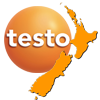
Infrared (IR) thermometers are incredibly valuable tools. This is due to their ability to accurately and consistently measure temperatures in different environments and scenarios. They are used in a vast array of industries that require reliable and efficient temperature measurements. It is important to note that these are industrial tools and not medical instruments designed to measure body temperature.
What is an Infrared Thermometer?
Testo makes industry-leading infrared thermometers that are highly precise, safe and robust. These kinds of thermometers use infrared technology to measure surface temperature - and in some cases internal temperature - in a quick, non-contact manner. In addition to traditional thermometers, pyrometers (also commonly referred to as laser pointer thermometers or IR thermometers) are also proven instruments for measuring temperature.
There are many different industries that benefit from a good infrared thermometer. This is because environmental control is important in quality control. Here are some of the different trades and occupations that rely on accurate measurement
- Electrical
- HVAC
- Processing plants
- Food productions, foodservice and retail
- And a range of other industrial areas.
Industrial infrared thermometers allow you to be able to carry out efficient and necessary temperature measurements. This includes providing accurate measurement and readings for reflective surfaces. The non-contact thermometer ensures that you are well equipped, and is particularly useful in undertaking control measurements in trade and industry.
Applications of Infrared Thermometers
Infrared thermometers have an array of industrial applications. A non-contact, infrared thermometer adds the benefit of giving accurate temperature readings of the surface or a chosen specific location. Consistency and accuracy are key in these uses and is often recorded to ensure safety.
Non-contact thermometers are also ideal for moving targets and machinery. This is because the temperature measurement can be taken from a distance. Furthermore, laser pointer thermometers can be used for hazardous or inaccessible targets. These accurate measurements not only provides an element of quality control but also protects the company from potential litigation
Maintenance
Many different industries are heavily reliant on their equipment and machinery working in peak condition to operate efficiently and effectively. Hotspots are usually an indication that there are potential issues that could arise in that piece of machinery. This is the very reason for the conduction of temperature audits. They are a proactive measure to prevent equipment from breaking down because an expert can assess the issues and possibly replace or fix the impending problem.
Building and Storage Temperatures
Infrared thermometers can be used by building and warehouse managers to find leaks in insulation. This is done by detecting surface temperature differentiations and allows them to ensure that the storage temperatures are accurate and at a safe level for their products. This can save the manufacturer money because they can address environmental related issues. Some products require specific temperatures and allow little to no deviation from them. This is why an accurate reading is necessary. An infrared temperature measuring instrument is able to assist with this.
Food Temperature and Incoming Goods Checks
It is crucial that certain food is transported, stored and served at a particular temperature. If supermarkets, caterers and other food businesses fail to do so, not only will their reputation be at stake, but they could be in violation of food safety regulations and even potentially harm their customers. View our Infrared Thermometers for food applications.
Mould Detection
The Testo 805i is a non-contact, infrared thermometer (as well as Testo’s Smart Probes App) are the perfect tool for detecting possible mould. Room temperature and humidity are valuable data points in detecting mould in the home or workplace.
How Do I Read an Infrared Thermometer?
Testo thermometers are incredibly user friendly. However, common mistakes still happen. In order to get the most accurate readings, it is crucial to know how to use them. Here are some of the most important rips
- Ensure that the lens is clean.
- Try to make sure that the surface is relatively dirt free.
- Get as close as you can to the target.
- Calibrate the tool.
- Ensure you have the correct emissivity setting.
How Do I Calibrate an Infrared Thermometer?
Accuracy is important to maintain your thermometer. One of the keys to ensuring accurate temperature readings is calibration. It protects both you and your clients from potential issues. Calibration includes documentation of the temperature deviation and calculation of the measurement uncertainty. This fact sheet goes into detail about the differences between calibration and adjustment. Here is the basic information that IR thermometer users should know in order to get the most accurate readings. The difference between calibration and adjustment is valuable to know:
- Calibration: Comparison of temperature measurement values, traceable to a (national) standard.
- Adjustment: Setting a measuring instrument to the smallest possible deviation from the correct value. In adjustment, interference with the instrument is necessary.
A knowledgeable professional can perform most minor adjustments themselves, but calibration can be more complicated. In these cases, Testo NZ offers a range of calibration services to ensure that your equipment is kept in line with New Zealand regulations and laws.
Testo NZ’s Selection of IR Thermometers.
Testo offers a wide range of infrared thermometers for a variety of different industries and sectors. Testo also has some of the best and classic tools that could increase your temperature gun measuring prowess. Here are just a few of the solutions Testo has on offer, including ones with infrared options and one with both laser and probe capabilities (which is especially useful in the food sector).
- testo 104-IR –Infrared & Probe thermometer
- testo 830-T1 and T2 –Infrared thermometer
- testo 805i –Infrared thermometer with smartphone operation
- testo 835-T1 -Infrared thermometer for measuring smaller objects

